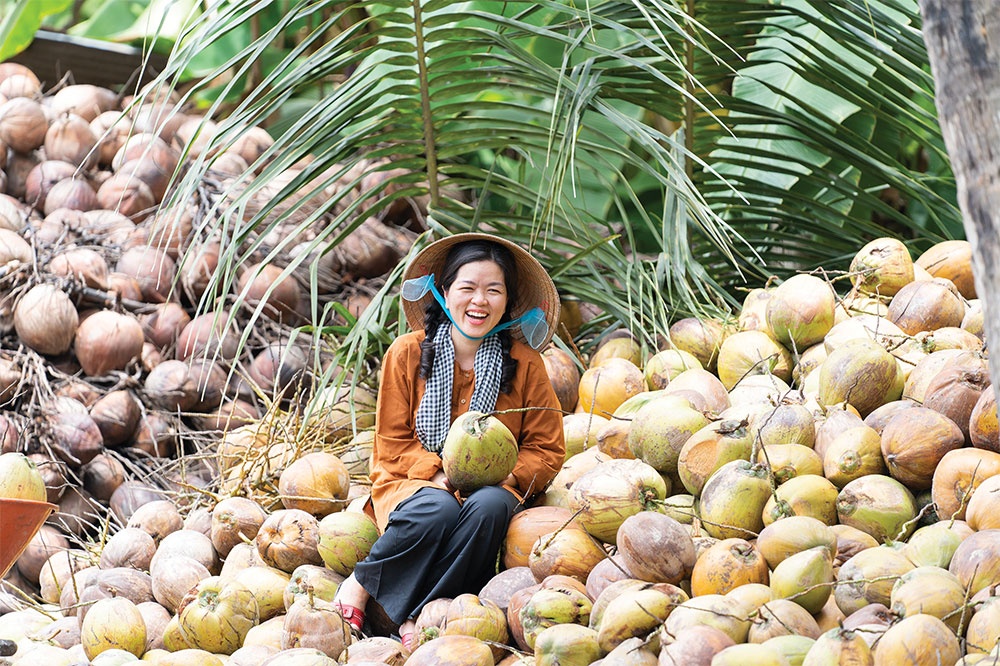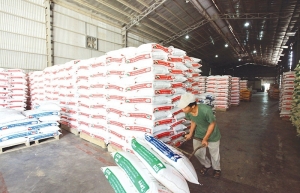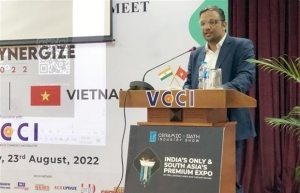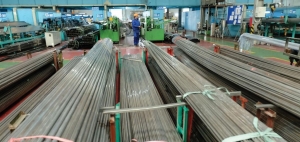Raw material processors on the march
 |
| Handfuls of companies that deal in raw materials for food are attempting to increase quality standards, illustration photo/ Source: Shutterstock |
Nguyen Van Thang, living in Tan Trung commune of the Mekong Delta province of Ben Tre, is part of some local households participating in an organic coconut growing project from ASIA Coconut Processing (ACP) under Asia Ingredients Group (AIG).
With a large coconut growing area, his family earns a stable income of more than VND700 million ($29,800) per year from organic coconut cultivation.
Thang said that since cooperating with ACP through a cooperative, he and the other households participating have been supported by the company with fertilisers and technical training programmes. ACP also buys coconuts at a higher price than the market, making them feel more secure.
“Every month, my family harvests about 800 coconuts, which is collected by the cooperative and transferred to the ACP factory. I really do not know the products ultimately made from these coconuts and their costs, but we know for sure they will be exported,” Thang said.
The whole Tan Trung commune currently boasts over 2,400 coconut-growing households across 1,160 hectares. The economic value brought from coconut trees have convinced farmers to switch crops and expand production area, which means that the raw material area of ACP is also increasingly expanding.
According to Le Nguyen Doan Duy, director of Business Development at AIG, the raw material area plays an essential role in deciding the quality of the company’s products because only sustainable and high-quality raw material areas can create good products.
“One of the group’s successes is building an organic material area with a long-term commitment. The company is committed to supporting capital, fertilisers, and offsetting the entire output of the products at a price 5-10 per cent higher than the market,” Duy said. “Organic materials through modern production processes will create high-value Vietnamese branded products, which not only help businesses increase profits but also benefit the community.”
ACP’s coconut-based products such as coconut water, coconut milk powder, and desiccated coconut are now widely exported to markets in Europe, the US, South Korea, Japan, Australia, and more.
Vietnam is considered one of the top five food baskets in the world with a rich source of food ingredients, of which the spice industry alone has a market size of about $1.4 billion, according to data from the Ministry of Industry and Trade.
On average, each year, Vietnam exports over $1 billion of cassava and cassava-based products, and about $4 billion of fruit and vegetable products, of which 70 per cent are fresh fruits to make concentrated juices. In addition, the export turnover of coffee and cashew have reached $4 billion and $3.6 billion per year respectively. Pepper and other condiments also reach more than $1.4 billion per year.
The attractiveness of the spice market in particular has attracted the participation of many international corporations such as Unilever, Ajinomoto, and Nestlé, and created fierce competition between domestic and foreign enterprises.
By the end of 2022, there were more than 8,500 industrial-scale agricultural product processing enterprises with a total capacity of about 120 million tonnes of raw materials per year. However, not all enterprises have the capacity and experience to process for export without consulting and support from international projects.
Son Ha Spice & Flavourings is such a business. A representative of the company said that it had faced a series of challenges including increasing demands from buyers on sustainable standards that respect the environment and biodiversity.
“We also lack experience in managing farmer groups and ensure that they apply sustainable practices in line with international sustainability schemes,” the representative said. “Social communication and marketing, a lack of contact with researchers and other bodies to seek technical assistances, and value chain development are also issues, given increased competition from other competitors.”
Son Ha did not previously have experience in new standards such as Union for Ethical BioTrade (UEBT) and Rainforest Alliance (RA), and in developing a biodiversity action plan.
Over the past two years, however, with support from a UEBT project funded by the Swiss government, the company achieved a record export of UEBT-certified cinnamon worth $25 million and diversified customers in the US, EU, and Australian markets. Son Ha was also the first spice company in Vietnam to obtain UEBT/RA certification for the cinnamon value chain in the provinces of Yen Bai and Lao Cai in 2021.
 | Raw material price hikes discouraging feed producers High prices of feed ingredients have been having an effect on feed producers while customers do not want to bear additional costs. |
 | Indian, Vietnamese firms seek stronger ties in building material sector A visiting delegation of Indian business executives from the ceramic tile, porcelain floor, wall and decoration tile, bathroom sanitary ware and related industries met with their Vietnamese counterparts in Ho Chi Minh City to compare notes and seek tie-ups. |
 | Building material sector faces tough times Building materials makers are facing multiple hardships due to surging input costs, slow consumption, and high inventory. |
What the stars mean:
★ Poor ★ ★ Promising ★★★ Good ★★★★ Very good ★★★★★ Exceptional
Related Contents
Latest News
More News
- State corporations poised to drive 2026 growth (February 03, 2026 | 13:58)
- Why high-tech talent will define Vietnam’s growth (February 02, 2026 | 10:47)
- FMCG resilience amid varying storms (February 02, 2026 | 10:00)
- Customs reforms strengthen business confidence, support trade growth (February 01, 2026 | 08:20)
- Vietnam and US to launch sixth trade negotiation round (January 30, 2026 | 15:19)
- Digital publishing emerges as key growth driver in Vietnam (January 30, 2026 | 10:59)
- EVN signs key contract for Tri An hydropower expansion (January 30, 2026 | 10:57)
- Vietnam to lead trade growth in ASEAN (January 29, 2026 | 15:08)
- Carlsberg Vietnam delivers Lunar New Year support in central region (January 28, 2026 | 17:19)
- TikTok penalised $35,000 in Vietnam for consumer protection violations (January 28, 2026 | 17:15)

 Tag:
Tag:




















 Mobile Version
Mobile Version